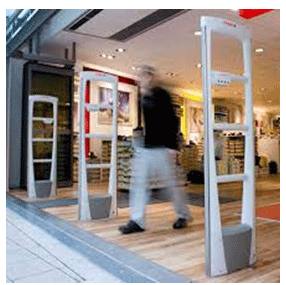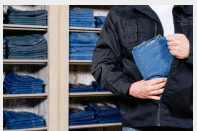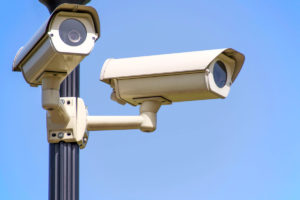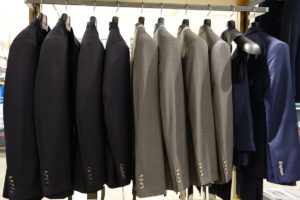 Preventing shoplifting is by far one of the major problem for big retailers. For the small retail store, shoplifting takes on a different meaning. For those stores, shoplifting threatens their livelihood and the prosperity of their community.
Preventing shoplifting is by far one of the major problem for big retailers. For the small retail store, shoplifting takes on a different meaning. For those stores, shoplifting threatens their livelihood and the prosperity of their community.
Shoplifting Prevention seminars are not only beneficial for the management personnel of big retail stores, but play an important aspect for the small mom and pop stores across the country. Knowledgable employees, management, and owners can greatly reduce the shoplifting incidents by being proactive and taking preventable measures to combat shoplifting in their stores.
Some of these preventive measures are:
1. CCTV cameras that are clearly monitored by trained personnel is an asset for every store. Positioning cameras with clear view of the aisles can deter the would be shoplifter from attempting to steal merchandise. Spacious and well lit aisles can help prevent the theft, or at least make the theft more difficult to achieve.
2. Parking lots, and spaces around your store should be well lit. Thieves like to inspect the place they are robbing. Providing a well lit store can deter the shoplifter from even entering the place.
3. Do not engage in any physical confrontation with them. The shoplifting issue can escalate and become one of life and death situation. Remember that safety should be your first concern when dealing with shoplifting suspects.
4. Customer service has been known to deter shoplifting incidents in a store. If your customer service is subpar, invest in the training of your personnel.
5. Facial recognition software can help you identify known shoplifters that are in a store’s database.
Preventing shoplifting incidents in your store is a difficult job that trained personnel should be specifically trained to deal with, and should be dealt with care. There are many shoplifting incidents where there are lives lost because non-trained personnel felt they could take care of it themselves. Lives lost, jail time,and lawsuits are some of the tricky issues stores around the country are dealing with year after year.
Training your loss prevention personnel is an investment the store, and you as an owner would benefit from having.

 The National Association for Shoplifting Prevention studies have shown that there is not a profile for a typical shoplifter.
The National Association for Shoplifting Prevention studies have shown that there is not a profile for a typical shoplifter.


 Would you knowingly buy a car with a defective engine? Of course not! So why would you hire a “defective employee”?
Would you knowingly buy a car with a defective engine? Of course not! So why would you hire a “defective employee”? When do closed circuit television malfunctions occur? I’m sure you can guess, it is always at the point when you need it most. I can’t recall the number of instances when I had a cash shortage I needed to look for and when I attempted to pull video through the DVR the video was already dropped or the camera wasn’t functioning. I remember having to look for an image of a suspect in a shoplifting incident and the picture was too grainy to be of any use due to a dirty camera lens or dome. One slightly embarrassing situation that stands out in my mind involved robberies that were taking place behind our store. I had developed a great working relationship with our local police department and they knew the quality of our camera system. Investigators came to me seeking assistance with outdoor camera footage to try to identify the criminals conducting the robberies. I pulled up video of the date and time in question and much to my chagrin the camera had a great shot of the ground directly underneath it. A power surge had impacted the programming of the pan/tilt/zoom (PTZ) camera and placed it in a default position. I had not noticed the problem in a timely fashion and could not recall how long it was before I did catch the issue. The good news was I was able to re-program the camera and eventually we did provide footage of an incident a little later that led to an arrest.
When do closed circuit television malfunctions occur? I’m sure you can guess, it is always at the point when you need it most. I can’t recall the number of instances when I had a cash shortage I needed to look for and when I attempted to pull video through the DVR the video was already dropped or the camera wasn’t functioning. I remember having to look for an image of a suspect in a shoplifting incident and the picture was too grainy to be of any use due to a dirty camera lens or dome. One slightly embarrassing situation that stands out in my mind involved robberies that were taking place behind our store. I had developed a great working relationship with our local police department and they knew the quality of our camera system. Investigators came to me seeking assistance with outdoor camera footage to try to identify the criminals conducting the robberies. I pulled up video of the date and time in question and much to my chagrin the camera had a great shot of the ground directly underneath it. A power surge had impacted the programming of the pan/tilt/zoom (PTZ) camera and placed it in a default position. I had not noticed the problem in a timely fashion and could not recall how long it was before I did catch the issue. The good news was I was able to re-program the camera and eventually we did provide footage of an incident a little later that led to an arrest. When I was a Loss Prevention Manager we would catch a shoplifter or a dishonest employee and recover merchandise. Depending on the type of case we would sometimes hold the evidence for a few days until the court hearing other times it could be much longer. If a shoplifter refused to plead guilty or requested a jury trial cases could be held up for months if not longer. I had several cases that went on for more than a year. Felony shoplifting cases and juvenile cases in our jurisdiction often meant lengthy wait periods depending on caseloads in the court. I also recall at least one shoplifting case in which the lawyer for the defendant requested extensions three separate times hoping that I would not appear for the hearing and the case would be dropped. No dice, I showed up for each hearing and finally the lawyer entered a guilty plea. The problem with the lengthy cases was that we would have to hold the evidence until the cases were settled. In some situations the police department held the recovered merchandise, such as when they stopped the suspect after the suspect fled the store. When merchandise has to be held for long periods it is possible for it to sit in evidence and be forgotten about. For stores that are too small to have security or Loss Prevention Departments management may be storing that evidence and no one is thinking about following up on cases with their police department or court.
When I was a Loss Prevention Manager we would catch a shoplifter or a dishonest employee and recover merchandise. Depending on the type of case we would sometimes hold the evidence for a few days until the court hearing other times it could be much longer. If a shoplifter refused to plead guilty or requested a jury trial cases could be held up for months if not longer. I had several cases that went on for more than a year. Felony shoplifting cases and juvenile cases in our jurisdiction often meant lengthy wait periods depending on caseloads in the court. I also recall at least one shoplifting case in which the lawyer for the defendant requested extensions three separate times hoping that I would not appear for the hearing and the case would be dropped. No dice, I showed up for each hearing and finally the lawyer entered a guilty plea. The problem with the lengthy cases was that we would have to hold the evidence until the cases were settled. In some situations the police department held the recovered merchandise, such as when they stopped the suspect after the suspect fled the store. When merchandise has to be held for long periods it is possible for it to sit in evidence and be forgotten about. For stores that are too small to have security or Loss Prevention Departments management may be storing that evidence and no one is thinking about following up on cases with their police department or court.